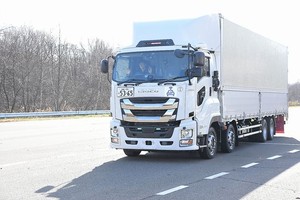REUTERS
May 24, 2022 at 11:15 JST
 Labor Party leader Anthony Albanese, center back, celebrates with his partner partner Jodie Haydon, right, and Labor senate leader partner Penny Wong at a Labor Party event in Sydney, Australia, May 22, 2022, after Prime Minister Scott Morrison conceding defeat to Albanese in a federal election. (AP Photo)
Labor Party leader Anthony Albanese, center back, celebrates with his partner partner Jodie Haydon, right, and Labor senate leader partner Penny Wong at a Labor Party event in Sydney, Australia, May 22, 2022, after Prime Minister Scott Morrison conceding defeat to Albanese in a federal election. (AP Photo)
SYDNEY--AustraliaŌĆÖs relations with China will remain challenging, Deputy Prime Minister Richard Marles said on Tuesday amid reports the Chinese premier had congratulated the new Labor government on its weekend election victory.
Ties between Australia and China, its largest trading partner, are at a low ebb after they clashed over a number of issues including trade, the origins of the novel coronavirus and accusations from Australia of Chinese political interference.
ŌĆ£From an Australian point of view, we understand the complexity of the relationship... but China is seeking to shape the world around it in ways we have not seen before,ŌĆØ Marles told ABC television.
ŌĆ£All of that I think is going to make it a pretty challenging pathway forward.ŌĆØ
Anthony Albanese, who was sworn in as AustraliaŌĆÖs 31st prime minister on Monday, said the bilateral relationship would remain ŌĆ£a difficult oneŌĆØ before he left for a Quad summit in Tokyo with U.S. President Joe Biden and the prime ministers of Japan and India.
The Quad is an informal security grouping seen in Beijing as an attempt to counter ChinaŌĆÖs growing influence in the Indo-Pacific region.
A Xinhua report said Chinese Premier Li Keqiang on Monday sent a congratulatory message to Albanese over his election win, possibly ending a two-year Chinese diplomatic freeze of Australia.
Marles said he was not aware of any communication from Beijing.
Labor returned to power as a wave of support for the Greens and climate-focused independents, mostly women, helped unseat the conservative Liberal-National coalition in SaturdayŌĆÖs general election.
Former Defense Minister Peter Dutton was shaping up as favorite to lead the Liberals, local media reported, after former Prime Minister Scott Morrison stepped down as party leader.
With votes still being counted, Labor is leading on 75 seats--one short of a majority. Some analysts predict Labor will get enough seats to govern on their own.




















A peek through the music industryŌĆÖs curtain at the producers who harnessed social media to help their idols go global.
A series based on diplomatic documents declassified by JapanŌĆÖs Foreign Ministry
Here is a collection of first-hand accounts by ŌĆ£hibakushaŌĆØ atomic bomb survivors.
Cooking experts, chefs and others involved in the field of food introduce their special recipes intertwined with their paths in life.
A series about Japanese-Americans and their memories of World War II